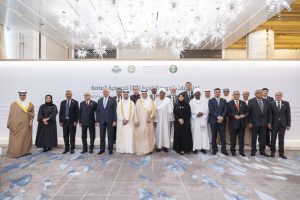DUBAI / WAM
Dr. Amna bint Abdullah Al Dahak Al Shamsi, Minister of Climate Change and the Environment, led the UAE delegation to the 38th session of the General Assembly of the Arab Organisation for Agricultural Development (AOAD), which concluded yesterday in Riyadh, Saudi Arabia.
The Ministers of Agriculture of the member states of the Arab League attended the meeting, which covered key topics aimed at strengthening the ties between Arab countries, and to enhance their agricultural cooperation and raise their contribution in improving Arab food security.
Al Dahak stressed that the UAE has an integrated vision to strengthen food security at the national level. This calls for transforming the country’s food ecosystems and the entire food value chain into sustainable climate-smart ecosystems to face climate change, as well as the challenges resulting from it such as scarcity of water resources and lack of arable land.
The vision also aims to establish advanced agricultural development projects and launch local and global initiatives to strengthen cooperation with friendly countries and relevant international organisations to enhance global food security as a shared goal that calls for coordinated action.
Al Dahak said, “The UAE’s participation in the 38th session of the General Assembly of the AOAD proved beneficial, as the UAE plays a significant and a very constructive role in endorsing the AOAD’s mission of advancing Arab collaboration in the areas of agriculture and food security. Throughout our participation, we emphasised our ongoing efforts in this regard by sharing knowledge and experiences and leveraging the UAE’s significant global role in applying modern agricultural and food security ecosystems to serve the efforts of Arab nations in developing their agricultural and food sector in a sustainable manner.”
Al Dahak emphasised that the UAE’s food security is an integral part of Arab food security and positively influences it. “The UAE, under its wise leadership, is making every effort to promote an integrated food security ecosystem that will increase its positive influence on the Arab food security ecosystem for the benefit of the people living in our Arab nations.”
Al Dahak praised the Kingdom of Saudi Arabia for hosting the 38th session of the General Assembly of the AOAD. Additionally, the Arab Republic of Egypt was recognised for hosting the AOAD headquarters. The headquarters of the AOAD were originally located in Khartoum, the capital of Sudan, but have been temporarily moved to Egypt where they will continue to be for the upcoming period.
During the meeting, a number of key topics were discussed, including the adoption of the organisation’s action plan for the year 2025-2026, monitoring the progress of work on the Strategy for Sustainable Arab Agricultural Development and the Arab Programme for Sustainable Food Security, and ways to enhance the Arab Strategy for Aquaculture.
The session also addressed the organisation’s support for the efforts of the Arab nations in implementing the three Rio Conventions on desertification, biodiversity, and climate change, as well as in identifying the themes for the AOAD Awards for Arab Food Security for the year 2024-2025. The delegates also agreed to establish the Arab Programme for Excellence in Building Capacities in Modern Agricultural and Environmental Technologies in the Arab and African regions in the Kingdom of Morocco.
On the sidelines of the session, the Arab Ministers of Agriculture met with Minister Plenipotentiary Dr. Raed Ali Saleh Al-Jubouri, Director of the Arab Organisations and Federations at the Arab League, to reach agreements on several matters. A major decision that emerged from the meeting was the change of name of Arab Organisation for Agricultural Development to Arab Organisation for Agricultural Development and Food Security. It was also agreed that the formation of a permanent ministerial committee for Arab food security will be chaired on a rotational basis by one of the Arab Ministers of Agriculture for a two-year term.
The Arab Organisation for Agricultural Development aims to develop the natural and human resources available in the agriculture, fisheries, and food sectors, while also improving their investments based on scientific methods. It also works to enhance plant and animal agricultural productivity, optimise the utilisation of fisheries resources, achieve the desired agricultural integration among Arab countries to achieve Arab food security, facilitate the exchange of agricultural and fishery products among Arab countries, in addition to supervising the implementation of programmes designed to confront food crises and enhance food security.
 The Gulf Time Newspaper One of the finest business newspapers in the UAE brought to you by our professional writers and editors.
The Gulf Time Newspaper One of the finest business newspapers in the UAE brought to you by our professional writers and editors.
